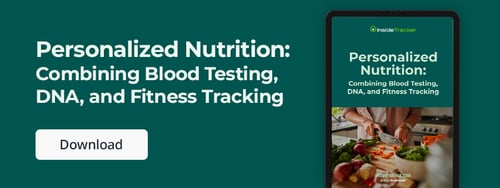 Where vegans take the crown
Where vegans take the crown
Cardiovascular health
LDL cholesterol than those who do not (reported consuming animal products once a month or more). And this checks out – a summary of multiple trials found that vegetarian diets result in lower 1 InsideTracker users who identify as vegan ( reported never or rarely eating animal products ) have well lowerthan those who do not ( reported consuming animal products once a calendar month or more ). And this checks out – a drumhead of multiple trials found that vegetarian diets result in lower LDL levels than those which include kernel .![]()
In a more general sense, massive studies of thousands of people agree that vegan diets are associated with a lower risk of cardiovascular disease than omnivorous ones.2-5 If you ’ re concerned with your heart health or have disturb controlling your cholesterol levels, consider reducing your animal product intake. Start with one meatless day per week !
Blood sugar levels
While the difference doesn ’ t appear to be huge in the chart below, vegan InsideTracker users do have significantly lower blood glucose levels than non-vegans. The same radiation pattern has been found in multiple studies ( the same goes for hemoglobin A1c, besides ! ) .1,6
![]()
This might not seem intuitive at first – glucose is a carbohydrate, and animal products by and large contain fat and protein, so where ’ s the overlap ? Well, the specific type of iron found in animal foods ( more on that in a minute ) may interrupt glucose metabolism.7 so if your glucose or A1c levels are above optimum, consider reducing your crimson meat intake .
Where meat-eaters have a leg up
Sex hormones
man who follow a vegan diet have significantly high Sex Hormone Binding Globulin (SHBG) than those who eat meat. This relationship holds on-key for women, besides ; vegan women have importantly higher levels than their flesh-eating ones .
SHBG safely transports sex hormones throughout the bloodstream and regulates their levels within the body. SHBG levels tend to increase in parallel with testosterone levels, given it ‘s responsible for regulating sexual activity hormone levels. additionally, SHBG prevents sex hormones from being cleared from the bloodstream, acting as a pool of reserved hormones that can be tapped into when levels become moo.
Since SHBG binds testosterone, high gear levels may create a false pretense of low testosterone levels. however, given the information above, SHBG prevents bound testosterone from leaving the body. Testosterone metamorphosis is complex and levels can be unoptimized for a variety of reasons, however, high SHBG is not the sole perpetrator .
![]() These patterns do appear to hold true for InsideTracker users – vegans have both lower testosterone and higher SHBG levels than non-vegan users. If you follow a vegan diet but are volition to experiment, try supplementing your diet with animal products and monitor your blood levels of SHBG and testosterone over time for any changes. Otherwise, be indisputable to monitor your protein intake and ensure you ‘re hitting your daily needs ( which depend on things like sex, historic period, and action level ). thoroughly plant-based sources of protein include bean curd, lentils, and pumpkin seeds .
These patterns do appear to hold true for InsideTracker users – vegans have both lower testosterone and higher SHBG levels than non-vegan users. If you follow a vegan diet but are volition to experiment, try supplementing your diet with animal products and monitor your blood levels of SHBG and testosterone over time for any changes. Otherwise, be indisputable to monitor your protein intake and ensure you ‘re hitting your daily needs ( which depend on things like sex, historic period, and action level ). thoroughly plant-based sources of protein include bean curd, lentils, and pumpkin seeds .
Iron status
People who eat animal products with high concentrations of heme iron ( the shape of iron found in animal sources ), like kernel and seafood, have importantly higher levels of hemoglobin and hematocrit than those who entirely get their iron from plant sources.13 This is because heme iron is perfectly structured for our bodies to absorb and use, directly influencing our bolshevik blood cell and iron biomarkers. Non-heme iron ( the mannequin found in plant sources ), on the other hand, is in a more unmanageable structure for our bodies to absorb. This much results in lower iron stores and levels .
![]()
In fact, vegan InsideTracker users have importantly lower levels of ferritin than those who eat animal products regularly. If you ’ re vegan and your iron markers, peculiarly ferritin, are abject, consume your iron-rich meals with a squeeze of citrus – vitamin C makes non-heme iron more bioavailable. Since ferritin is a marker of long-run cast-iron condition, it ’ mho behind to respond to any changes we make in our diet – be certain to re-test at least 3 months after your initial results to track changes over time .
What we’ve learned
Of course, it must be acknowledged that there are enough of factors ( differences in physical activeness, early life style habits, etc. ) that may be inherently unlike between vegans and non-vegans, and consequently contributing to the differences we see between InsideTracker groups. But when considered alongside the numerous studies with similar findings, it seems the skill does in fact add up.
When making decisions about the room you eat, there are countless factors to consider ( price, environmental impact, approachability, etc ), of which health is precisely one. Both herbivores and omnivores can be exceptionally healthy, and you do n’t necessarily have to compromise on the diet practice that makes feel for you and your values. But ultimately, understanding how your torso responds to your diet at the blood grade is the only manner to know if your consume habits are promoting good health .
References :